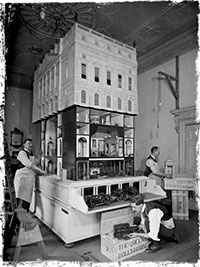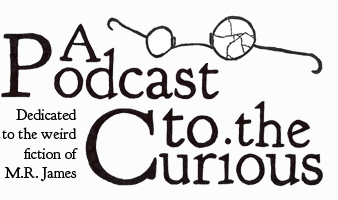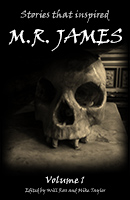 This episode Will and Mike delve into the toy box and pull out something truly horrible in the form of ‘The Haunted Doll’s House‘ by M.R. James!
This episode Will and Mike delve into the toy box and pull out something truly horrible in the form of ‘The Haunted Doll’s House‘ by M.R. James!
Show notes:
- Queen Mary’s Dolls’s House
This story was written for a real dolls’ house, the one created by the architect Sir Edwin Lutyens for Queen Mary of Teck between 1921 and 1924. The dolls’ house in currently on display in Windsor. Further details can be found at Wikipedia. - Strawberry Hill House
James describes the dolls house in his story as being ‘Strawberry Hill Gothic‘ in style, the ‘quintessence of Horace Walpole‘. Walpole’s gothic castle-style house inspired a generation of architects when it was built on the banks of the Thames in London in the mid 18th century. - Dolls’ Houses: It’s a Small World
This enjoyable Guardian.com article looks into the world of modern day dolls’ house collectors. - Interview with Stephen Gray
Episode 21 of this very podcast featured an interview with filmmaker Stephen Gray who has recently completed a short film adaptation of this story. Watch it on Vimeo. - Ghosts & Scholars notes
The ever-reliable Ghosts & Scholars website contains a useful set of notes on this story compiled by Rosemary Pardoe. - A frog the size of a man?
Jim Moon’s excellent illustration. - Improvised Radio Theatre – With Dice!
Many thanks to our reader this week, Roger Burton West. His new RPG podcast is great – and HPL fans will appreciate the domain name…
Podcast: Play in new window | Download
Subscribe: RSS
Tags: A Warning to the Curious, Dolls House, Ghosts, Horace Walpole, M.R. James, Montague Rhodes James, Mr Chittenden, Mr Dillet, Queen Mary's Dolls' House, The Haunted Dolls House, Toys








You speculate about the Canterbury and York Society.
Founded in 1904, they still exist,and publich some very dry-sounding ecclesiastical history titles, that Monty would have been familiar with: http://canterburyandyork.org/
Glad to see the podcast back! I missed this, even though I was pleasantly surprised by the Saki reading.
I’ll confess I haven’t actually read this story, and James’ thing he wrote about rehashing The Mezzotint put me off, as well as the subject matter – I failed to see how a doll’s house could be frightening in any way. After listening to the podcast, I know a bit more and might get to it in the future, even though it doesn’t seem especially…well, good.
Looking forward to Uncommon Prayerbook, I remember reading it and kind of liking it, but not really getting it.
Another great podcast. Interesting thoughts about James’ apologia – I’ve also always thought “Oh Whistle” and “A Warning to the Curious” have much more in common than this story and “The Mezzotint”. James retained the copyright of this story, unlike a lot of the other authors asked to contribute to Queen Mary’s dolls’ house, who gifted their rights to the queen (by all accounts, a formidable figure with a will of iron – it must have taken some courage on MRJ’s part not to do so).
PS – I think Merewether would normally be pronounced Merrywether 🙂
Damn! Me and Mike had a conversation before recording about whether it should be pronounced ‘Merrywether’ but we decide to go with the other!
Interested to know what you are going to make of “An Uncommon Prayer Book” – it’s a good story, but one otherwise unimportant aspect of it does show James’ social and political attitudes (such as they were, and they weren’t especially remarkable in England at the time) in a not very pleasant light for the modern reader.
This has been a favourite of mine for a while, in spite of the similarities of core story. (For me, that encourages me to pay more attention to the framing narrative.) Thanks for the chance to read it!
I do love Mr Chittenden’s second appearance, particularly the way he tries to guard himself from any accusation of wrong-doing.
An odd inconsistency, since James usually gets these things right: in the first description of the house, we’re told about the bell on the chapel, but later when it’s tolling it’s over the stable.
The bell has been moved from the chapel of the (demolished) house which provided the model for the dolls’ house, to be reused as the stable-clock bell of the new house.
Ah, that would make sense!
I hadn’t spotted the inconsistency with the bells, I suppose if it was a really large and grand house both the church and the stable block could have their own separate bells.
I’ve always preferred this story to “The Mezzotint”. It IS a rehash, but I think it’s better written – more detailed and more vivid. As you pointed out, James did repeat plots elsewhere as well. This doesn’t bother me, as the writing is so good. By the way – I like the touch near the end where Mr Chittenden admits that he paid only £10 for the dolls’ house, and that he got it from someone who wasn’t one of his regular contacts, and whom he hasn’t seen since. How did that someone come by the house?
You once mentioned that you’d been considering what to deal with, once you reached the end of James’ stories. How about Edith Wharton? Her ghost stories seem to be strangely neglected, considering the fame of her other fiction. I think her ghost stories are, in their very different way, as good as James’s. Is this heresy? I certainly think that they’re far better than anything I’ve read by the so-called “James Gang”.
HERETIC
No, I was thinking that they might go onto stories by the Benson brothers, since Arthur Benson knew James and wrote ghost stories. There’s R.H. and E.F. Benson, too, the latter of which who turned out to be more popular.
Edith Wharton is certainly on my mental list for possible inclusion in future episodes, I have a Wordsworth edition of her ghosts stories on my shelf which I occasionally dip into and like a lot (and it would definitely be good to cover some female authors for a change!)
Don’t miss Mrs. Oliphant’s The Open Door when you go for the ladies. It’s one of my all-time favorites.
I agree. Edith Wharton’s ghost stories are excellent; subtle but still frightening.
Absolutely! Edith Wharton, please!
Though it was not mentioned I thought of the creature from Casting the Runes in the slideshow. The creature that hopped through the forest and might have caused the man to climb the tree.
I found the haunted doll’s house far from gripping and I think the main reason is that, unlike the mezzotint, there’s a very big shift from the object when first seen, and the object when telling the story. It’s seen from afar, under a sky, has more rooms and is populated by people. Everything seems to be jumping up and down saying “This is a story, this is not actually happening in your room in front of you.”
I also feel that the biggest failing of both stories is that the house shown isn’t the one in which the observer is watching. I always felt that, if it were, this would add a lot of tension.
I like the idea of him realising the house he is watching is his own, it’s like a twist on the classic slasher-movie ‘the call is coming from inside the house...’ thing!
I had a thought on the rationalization of the doll’s house thing. I think a modern descendant might be the miniature wargaming scene, like Warhammer 40,000, where you intricately paint plastic and metal figures, ranging from people to huge creatures and set them into equally detailed environments like castles and tanks and giant flying cathedrals (or you’re supposed to). Just a comparison, really.
And the Deep Ones are actually described as fish-FROGS, not fish-people, even though most people today will call them fish-people. Lovecraft himself describes them as ‘batrachian’, which is to say they look like frogs.
And maybe the vengeful spirit wasn’t actually frog like, but perhaps a bloated corpse?
Yes, that’s certainly how I thought of him – a diabolically-animated corpse, just about recognisable to someone who had known him.
Me too. I saw it as the darkened skin and bone-thin limbs with distended belly of a corpse that’s been in the ground a bit.
Regarding talk of what to do when the James stories are finished i though that perhaps a “best of” the writers inspired by James might be worth considering,while they are an uneven bunch there are some pretty good stories among them.H.R.Wakefield for example has a fantastically creepy tale called “First sheaf’ which should appeal to anyone who enjoyed the “Wicker Man”.Rolt,Munby,Malden and Swain pretty much only produced one volume of stories each but there are probably a couple of worthwhile stories in each.And as i suggested last year i still think E.F Benson might be another name worth considering..Best wishes Lachlan
Glad to see that I’m not alone in admiring Wharton. The only reservation I have is that perhaps there’s not a great deal of explaining, or tracing of references, to do, compared to MRJ.
Can I raise another matter? I’ve always thought that my enthusiasm for MRJ is caused by his style – I think he’s a far better writer than any other ghost-story writer I’ve read (apart from Wharton). What’s odd is that his style in his other writing seems very different. It’s even different (I think) in most of his unfinished stories. Does anyone agree?
I confess I’ve never read anything else by James other than his ghost stories. What draws me is his descriptions of horror and monsters, how he really finds a way to make them uncomfortably physical and imagination and understanding of what freaks people out behind them.
I think it’s because James had such a conversational style to most of his ghost stories. He wrote a lot of them to be read aloud, and this clearly garnered much praise, so he stuck to it because it’s also a natural sort of style, simple recital of a story instead of trying to create flowery prose or obvious effort of painting scenes with words. There’s a certain humour in some of it, too, it almost feels like a friend going ‘dude, I swear to GOD this happened, you gotta hear it…’.
He was so good at creating an atmosphere that, even though very little of us now are musty antiquarians with a fondness of church architecture, you kind of get what he’s talking about . It’s that musty atmosphere that seems to safe and good until this bizarre horror is thrust in, and it’s quite jarring and makes you look twice back on this twee world of medieval pamphlets. You know you’re in for a ghost story, expecting gloomy wraiths and pale, forlorn shades – not spidery demons, black slimey horrors and manifestations made of hair.
I wonder about the husband in the dolls’ house story. Eventually Merewether ends up with all of the money inherited from his wife’s father, and with no encumbrances, living in what’s described as “elegant” seclusion, which I interpreted to mean rolling in cash and probably, you know, inventing his own religion or something… Could the story that replays in the dolls’ house be something of a lie? Could Merewether himself have been responsible for all the deaths? Killing your father-in-law, wife, and children is not much weirder than killing your grandchildren from beyond the grave, is it? I suppose the “sorry guys, this is just like the Mezzotint” disclaimer pulls the plug on this theory, but still I kind of like it. After all, we only have Merewether’s version of the story. He’s certainly mixed up in something seriously shady, so why should we necessarily believe him?
About the “collectors’ palaver”, it makes me think of P.G. Wodehouse’s Bertie Wooster being instructed by his aunt Dahlia to go and sneer at an antique cow-creamer, so Dahlia’s (very wealthy) husband, an avid collector, could pay less for it.
More small points. First, that if the reference to the “English Vitruvius” is anything more than vague flattery, then the man wouldn’t dream of living in a house which was Strawberry Hill Gothic.
Second, that the appearance of the father dressed as a ghost would probably mean that when, later, the old man comes in to kill the children, they won’t be afraid, at least not immediately.
Third, that if James was commissioned by Royalty to write a ghost story about a dolls’-house, he didn’t have much choice of subject. I’d be surprised if the disclaimer at the end appears in the original publication.
Fourth – it’s odd that the first audible event is the death of the children: up to then, everything is, as you observed, a silent movie.
Other than the bell, anyway.
As I make my way to catch up to the latest show, and as a Yank, I was pleased to learn a new word last night – “doolally.” Excellent!
I’ve always assumed that grandpa comes back for the children in order to destroy the Merewether line. If this is so, and if Mrs M dies soon after her father, then how is J. Merewether Esq., of Ilbridge House, related to the family?
One kibbits about your take on Dillett and dollhouses: the way I read this, he collects rare objects, not only dollhouses. That this one is such a premier example of a dollhouse is more important than it being a dollhouse. If it’d been a fantastic battle set with lead soldiers it’d be as desirable, or a Chinese tea chest, etc.
I don’t know about rich folks in UK but in US, Dillett is just like them: penny-pinching to an annoying degree and smug about it. The few times I’ve been at parties at rich folks’ houses, all they talked about was how they’d got something for a song or saved money on something else. It was sort of revolting to a person who works for a living like I do. They were decent people but where money was concerned they were absolutely tight-fisted.
I love your compassionate take on it, that they might’ve been driven to the murder by granddad being intolerable and, well, like Dr. Rant in Tracctate Middoth.
As for Dillett not seeming very shaken, I got from him sitting up all night that he was shaken to his core. Haven’t you ever had a nightmares so unnerving that you sat up the rest of the night with an overclocked heartbeat, afraid to shut your eyes and flinching at shadows? That’s how I read that. The lack of screaming and crying is just the Victorian British reserve.
Great as usual, guys. I’ve been waiting for snow to read James and listen to corresponding episodes, and here we are. I forget where I left off last year (new phone) so I’m a little all over the place.
What is significant about the will? It seems like Gramps is anxious for the lawyer to get there but they kill him before he has the chance to what? Change his will in favor of someone else? Surely not the kids who FroGramps kills.
I too saw the dollhouse as an expression of the father’s guilt. Quite creepy. And I thought the wife was more sinister. She had that face, and she ostentatiously listened at the window… quite nasty.
And I agree James should have omitted the disclaimer (I prefer Mezzo–it’s spookier.) It speaks to his nature, I think. He’s not a showboat or someone who would be keen to be seen getting away with anything. Let’s face it, it would be slightly dishonest to regurgitate an older story. Which these days is done way more often. Thanks, movies!
Also, if I were the head of a network of studio I’d be giving Stephen Gray a call. Maybe we should lobby Mark Gatiss to watch Doll’s House? (Mr. Gatiss, why have you not adapted more James? I was hoping that would be a yearly tradition.)
I agree. Edith Wharton’s ghost stories are excellent; subtle but still frightening.
My theory regarding the scene where the father frightens his children by pretending to be a ghost and then reassures them is that, since the grandfather’s death, the children have been disturbed and frightened at night. The parents think they’re just imagining things. Hence the pantomime – see, it isn’t a ghost, just papa wearing a sheet.
I have for a few years wanted to make this comment. Both for this and ‘The Mezzotint’ there was dialogue about how they were not scary.
For me, who read them as a child, they were the most scary of them all.
So in all the others there were ways out. Don’t take the crown, don’t try to steal treasure . . .
People made choices. But for whom?
I read them as a kid, and basically they told me that life was not fair and that totally independently of you, your parents’ behavior could get you killed in a horrible manner. And you had no input. The kids made no choices but were the ones targeted.
While I love the stories, those were the two that totally scared the crap out of me early in my life. I had nightmares for years. But I still love the stories.
It is all in the perspective.
Rather belatedly, apologies — but I did come across a reference to Queen Mary’s acquisitive habits in that other, long-overlooked Jamesian East Anglian antiquarian, Lovejoy.(*). Not the TV series, which you guys rightly defined as twee, but the more bleak and vicious novels. In ‘Gold from Gemini’ (1979?), our hero(?) says,
“Janie got me a recent biography – Queen Mary. I read it, not to see if they mentioned her fabulous collection of jade snuff bottles, but to see if it mentioned how she acquired it. It didn’t. They never do, which really tickles me. Word is that round the British Museum an impending visit from the great lady acted like a tocsin warning of the Visigoths landing. She’s rumoured to have admired any particular jade piece with such fixed (not to say immovable) admiration that, just to get off the hook, squirming administrators felt compelled to offer her the object. Graciously accepted, of course. I really admire her for that, a collector after my own heart. An example for us all to follow. Of course, it’s taking advantage of one’s position. But do you know anyone who doesn’t? Even God does that.”
So there you have it, the overly-eager collector confirmed by another antiquarian of note! 😉
(*) Yes, I have been looking up Lovejoy with some idea of a Jamesian-Lovejoyian pastiche. I’m not getting anywhere with it, except for more and more fascinated by the appropriate and strange potential for blending the two.
I came here to say: I have a hypothesis re: what James meant to convey when Dillard removes the grandfather from the bed. James describes the feeling of aliveness as an “unpleasant give.”
I wouldn’t be commenting right now if this didn’t happen yesterday. I was gardening and pulled up a newt and it also had an unpleasant give to my fingers. I knew instantly I’d picked up an animal instead of weeds. It freaked me out even though I knew nothing could hurt me.